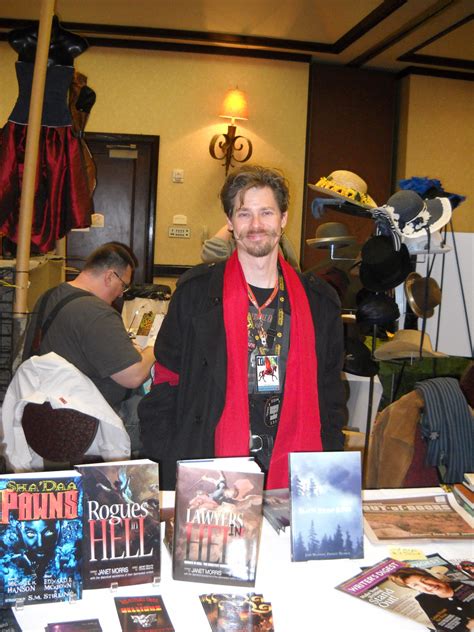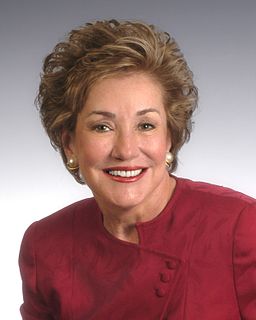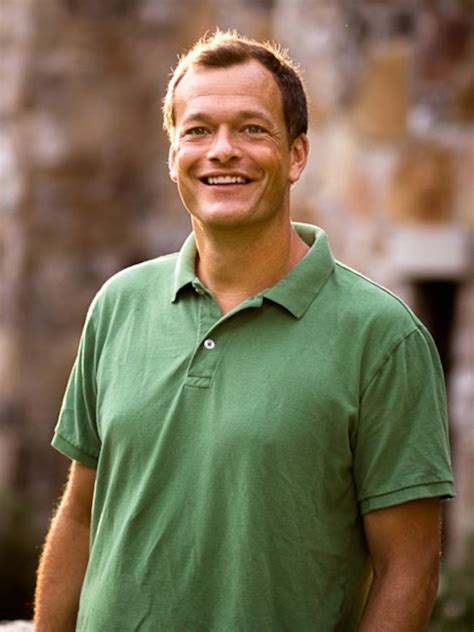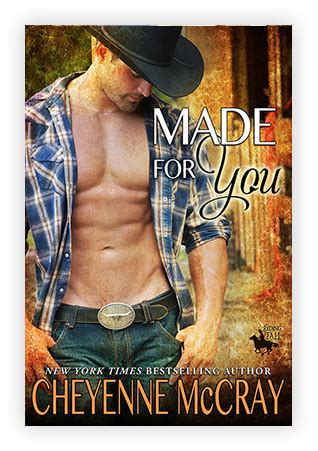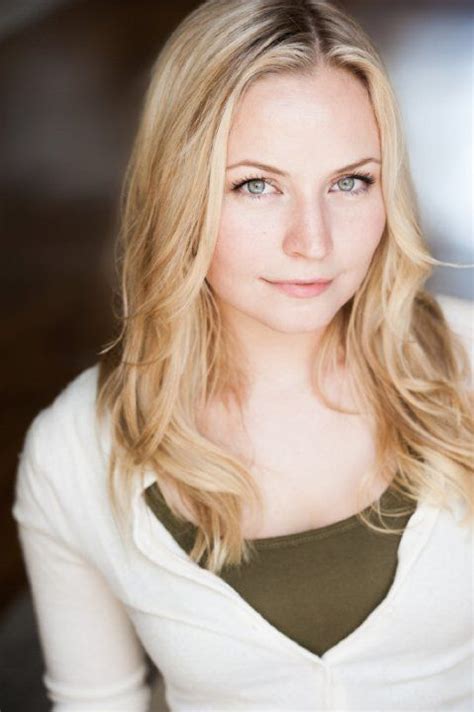Top 95 Anthology Quotes & Sayings - Page 2
Explore popular Anthology quotes.
Last updated on December 4, 2024.
You can see the diversity that pieces in the anthology represent, and then the interconnections-obvious and less obvious-between various stories or between various modes of storytelling. Diversity generates need for conversation, conversation generates common interests, as well as differences. Literature, as a human project, is all about that.
There are many other writers whose work I admire tremendously, but none whose work struck me at just the right young age. Jack Vance taught me that speculative fiction, science fiction, could be wonderfully and liberatingly stylistic. It didn't have to be pulp stuff. He really changed my writing and my view of science fiction, so if nothing else, my little homage to him in the novelette I wrote for that anthology is my thank-you to him. He helped me see that any genre can have excellent writing in it.
Usually at the end of each story we're thrown clear out of the story's world and then we're given a new world to enter. What's unique about a linked collection is that it can deliver both sets of narrative pleasures - the novel's long immersion into character-world and the story anthology's energetic (and mortal) brevity - the linked collection is unique in its ability to be both abrupt and longitudinal simultaneously.
I started moving away from poets like Wallace Stevens and Hart Crane and started reading poets like, again, Karl Shapiro, Howard Nemerov, Philip Larkin, and the British poets who were imported through that important anthology put together by Alvarez - and those would include Thom Gunn and Ted Hughes. And I think these poets gave me assurance that there were other ways to write besides the rather involuted style of high modernism whose high priests were Pound, Eliot and Stevens, and Crane perhaps.
I often notice how students can gain the capacity to use certain critical methodologies through engaging with very different texts - how a graphic novel about gentrification and an anthology about Hurricane Katrina and a journalistic account of war profiteering might all lead to very similar classroom conversations and critical engagement. I'm particularly interested in this when teaching law students who often resist reading interdisciplinary materials or materials they interpret as too theoretical.
Streets teemed with hell's wretched souls. New dead with their gadgets and old dead from antiquity. Demons roamed the avenues and alleyways, tormenting hapless damned at random with branding irons, flaming pitchforks, and razor-wire whips. -From the story Remember, Remember, Hell in November, in the anthology, Lawyers in Hell.
I have a lot of stories. I had done a thing called Nightmare in Red White and Blue, which was an anthology of horror films. I narrated it with a man named Joe Maddrey, who's a writer. He came to my house and said, "Lance would you consider doing this?," and I like Joe so much that I completely relaxed.
After my grandfather died I went down to the basement of my family house where my family kept books, anthologies and things and there was an anthology without any names attached to it and I read a poem called Spellbound and I somehow attached it to my grandfather's death and I thought my grandfather had written it.
To be fair, much of the Bible is not systematically evil but just plain weird, as you would expect of a chaotically cobbled-together anthology of disjointed documents, composed, revised, translated, distorted and 'improved' by hundreds of anonymous authors, editors and copyists, unknown to us and mostly unknown to each other, spanning nine centuries
We know story collections end when they end, as well - the pages serving as a countdown - but nevertheless the standard story anthology hews closer to what makes being human so hard: it reminds you with each story how quickly everything we are, everything we call our lives can change, can be upended, can disappear. Never to return.
I read a lot - surveys of vernacular music. A lot of it is the Harry Smith Anthology of American Folk Music, which I've loved since I was in high school. They had it at the library and I always thought that was interesting, even when I was into punk and stuff. Just the history of storytelling and the amount of melancholy a lot of old music has.
There has to be a kind of grassroots push, a movement, as it were, against the inherent isolationism of American capitalism as practiced in the publishing industry. There need to be grants and government support and a few publishers, mainstream and independent, who are not afraid to challenge American readership. We need to build a network of translators, publishers and readers. We hope that our annual anthology might provide an upsurge in interest for European fiction and then, as we publish it every year, become a habit to many readers.
Whether on the floor of Congress or in the boardrooms of corporate America or in the corridors of a big city hospital, there is no body of professional expertise and no anthology of case studies which can supplant the force of character which provides both a sense of direction and a means of fulfillment. It asks, not what you want to be, but who you want to be.
Now it’s either about technology that doesn’t work or about technology that’s used in bad ways. The anthology of the top twenty-five sci-fi stories in 1970 was, like, ‘Me and my friend the robot went for a walk on the moon,’ and in 2008 it was, like, ‘The galaxy is run by a fundamentalist Islamic confederacy, and there are people who are hunting planets and killing them for fun.’
I once was asked to contribute to a mushroom poem anthology. I didn't have anything, and so instead ended up writing the introduction. I think that request made me more alert to mushrooms, and now they've cropped up in my work, the way mushrooms themselves do after rain, quite a lot. But I've only just now taken up mushroom hunting, after going to a class offered at my local library.
When you listen to the Anthology of American Folk Music, or anything like that - a compilation of garage bands from the Northeast in the early '60s - you're not necessarily listening to the band and thinking about the lead singer, or the story of the group, or the context or the mythology of the group. You're just listening to the song and whether or not it has a hook.
Do you know what the lurid intermixture of complicated emotions produces, according to Nathaniel Hawthorne? That's right, it produces the illuminating blaze of the infernal regions. Ryan MacDonald's glorious shards of prose are both lurid and blazing, and together they comprise an anthology of complex feelings-dream-like, vivid, and never, ever obvious.
Claudia Rankine's Citizen comes at you like doom. It's the best note in the wrong song that is America. Its various realities-'mistaken' identity, social racism, the whole fabric of urban and suburban life-are almost too much to bear, but you bear them, because it's the truth. Citizen is Rankine's Spoon River Anthology, an epic as large and frightening and beautiful as the country and various emotional states that produced it.
Zane brought her hand to his chest, over his heart and she felt the strong rapid beat through his shirt. “Feel that?” His throat worked as he swallowed. “It would break if I fell for you and anything happened that would take you away from me.” --Zane to Willow in 'The Edge of Sin' in the Real Men Last all Night anthology
I regret that there aren't more short stories in other magazines. But in a certain way, I think the disappearance of the short-story template from everyone's head can be freeing. Partly because there's no mass market for stories, the form is up for grabs. It can be many, many things. So the anthology is very much intended for students, but I think we're all in the position of writing students now. Very few people are going around with a day-to-day engagement with the short story.
When you're a young writer and you look at people praising a big hefty anthology that has uncovered a long lost genre, it can be disorienting to look inside it and think, "But what it's uncovered still isn't me. What does this mean? Do I not belong in this genre, or is there more of the genre yet to find?"
If I looked at some of these pieces as if this project was not spoken-word but just short anthology, I probably would have fussed with some of the sentences, you know? Syllabication and prosody and such crap. Because the printed word is etched in stone. But for reading purposes I accepted this book of texts in the manner in which I wrote them, no need to fuss. Most of the shorter stuff was written as poetry. Meaning lots of white space on the page.












